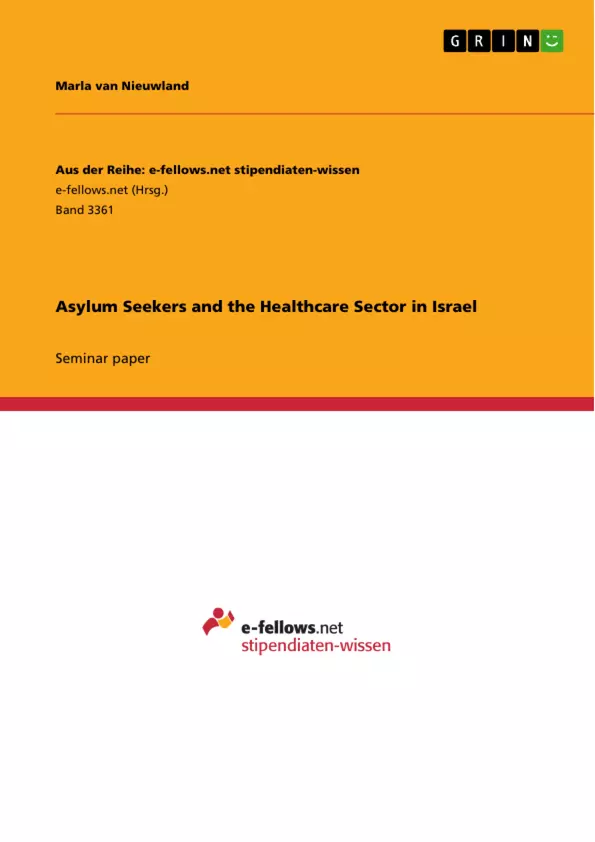This paper aims to address the research question: How satisfied are asylum seekers with healthcare services in Israel? The question is specifically framed in a way that encourages asylum seekers’ advocacy and participation in the discussion, because previous research has too often only talked about asylum seekers’ needs and not with the asylum seekers themselves. Two interviews with an Eritrean and a Sudanese asylum seeker have shed a light on the general situation and satisfaction of asylum seekers with healthcare services in Israel. Resulting from the findings of the interviews, the study also proposes governmental action that can and should be done to address and improve the satisfaction of asylum seekers with the healthcare sector in Israel. The remainder of this paper will proceed as follows: in the next chapter, the relevant terms will be defined, followed by a literature review of existing research. Then the research design will be discussed as well as the content of the interviews and the relevant findings. After a short elaboration of the limitations, the study will be concluded.
The presence of African asylum seekers is a relatively new phenomenon in Israel. Only since 2005 people have begun to flee to the Jewish country. The majority comes from repressive regimes in Eritrea and Sudan. And it was only until 2012 that they could cross the border from Egypt to Israel, before a wall was erected that immediately stopped the migration flow. It has been almost 15 years since the arrival of the first wave of migrants, but the life of African asylum seekers still continues to be harsh in Israel. To this day, only 14 people have received official refugee status, while there are currently 35,000 asylum seekers either still waiting for their asylum procedure to be finished or they have been denied the refugee status and are only temporarily allowed to stay in the country. The legal status of asylum seekers in Israel comes essentially without any basic liberties and people face the threat of deportation on a daily basis. Asylum seekers lack access to healthcare services and usually do not have an official work permit, which forces migrants to work under illegal and exploitative conditions in order to earn their income. Furthermore, many asylum seekers have experienced torture and exploitation on their way to a safe country.
Inhaltsverzeichnis (Table of Contents)
- Introduction
- Definitions
- Literature Review
- Research Design
- Interviews
- Results
- Limitations
- Conclusion
Zielsetzung und Themenschwerpunkte (Objectives and Key Themes)
This paper investigates the satisfaction of asylum seekers with healthcare services in Israel, aiming to understand their experiences and advocate for their needs. The study focuses on the perspectives of asylum seekers themselves, a previously underrepresented voice in this field.
- The challenges faced by asylum seekers in accessing healthcare in Israel
- The experiences of asylum seekers in navigating the Israeli healthcare system
- The role of the TEREM Public Health Clinic in providing healthcare for asylum seekers
- The potential for governmental action to improve the satisfaction of asylum seekers with healthcare services
- The intersection of immigration, healthcare, and human rights in the Israeli context
Zusammenfassung der Kapitel (Chapter Summaries)
- Introduction: This chapter provides an overview of the situation of asylum seekers in Israel, highlighting their precarious legal status and limited access to basic rights, including healthcare. The study's research question and objectives are presented, emphasizing the need for asylum seekers' voices to be heard in discussions about their healthcare.
- Definitions: This chapter clarifies the distinctions between different groups of migrants in Israel, including asylum seekers, refugees, and labor migrants. The legal status and rights of each group are explained, highlighting the unique challenges faced by asylum seekers in accessing healthcare.
- Literature Review: This chapter reviews existing research on the health of asylum seekers and labor migrants in Israel. The focus is on the role of the open clinic in providing healthcare for these groups, and the tensions between humanitarian and political approaches to their situation.
- Research Design: This chapter outlines the methodology employed in the study, including the selection of participants and the design of the interview questions.
- Interviews: This chapter presents the findings of the interviews conducted with Eritrean and Sudanese asylum seekers, providing insights into their experiences with healthcare services in Israel.
- Results: This chapter analyzes the interview data to identify key themes and patterns related to the satisfaction of asylum seekers with healthcare services.
- Limitations: This chapter acknowledges the limitations of the study, including the small sample size and potential for bias.
Schlüsselwörter (Keywords)
This research focuses on the intersection of immigration, healthcare, and human rights in the context of asylum seekers in Israel. Key concepts explored include asylum status, access to healthcare, healthcare satisfaction, governmental action, and the role of voluntary healthcare services.
- Arbeit zitieren
- Marla van Nieuwland (Autor:in), 2019, Asylum Seekers and the Healthcare Sector in Israel, München, GRIN Verlag, https://www.grin.com/document/534864



